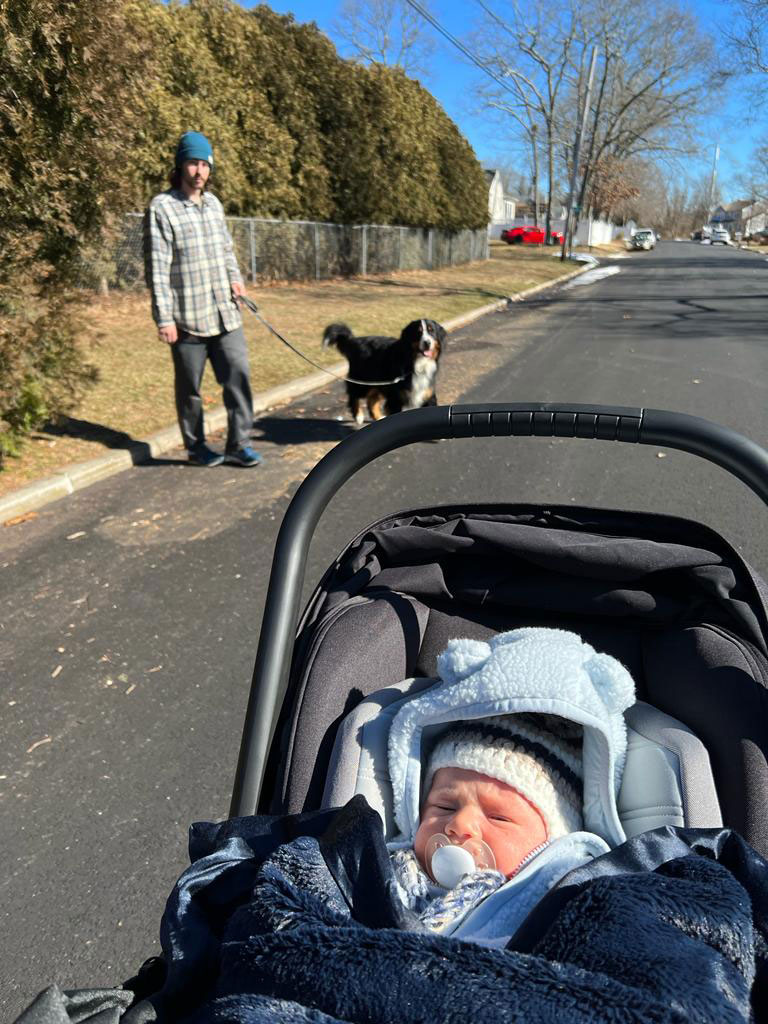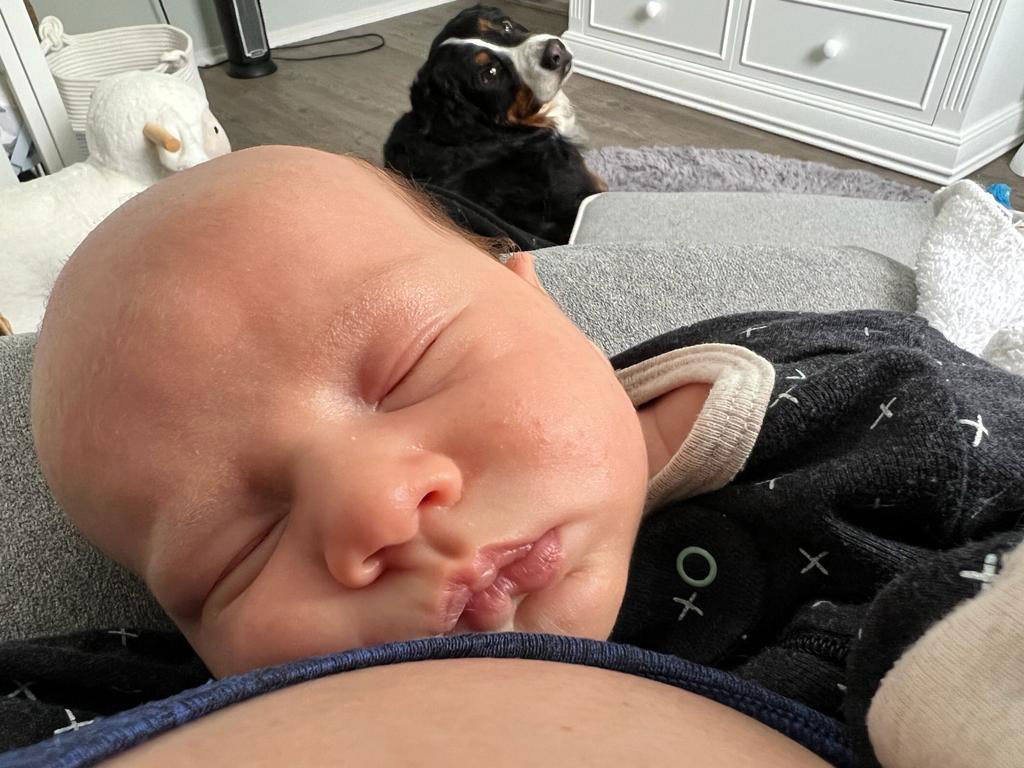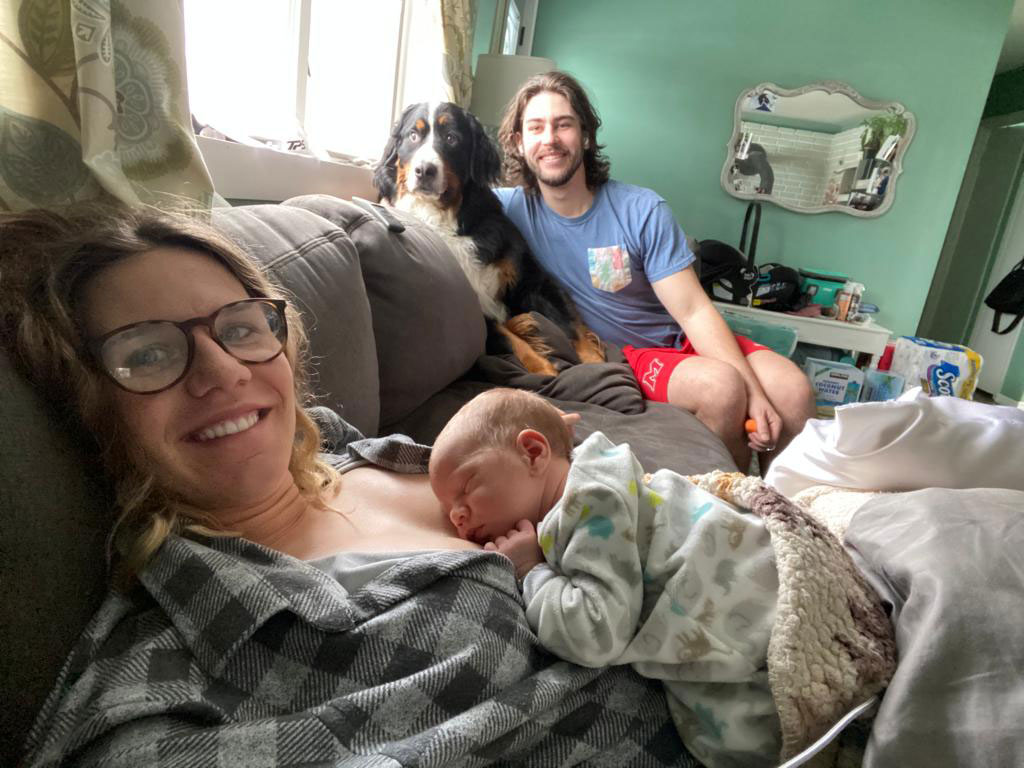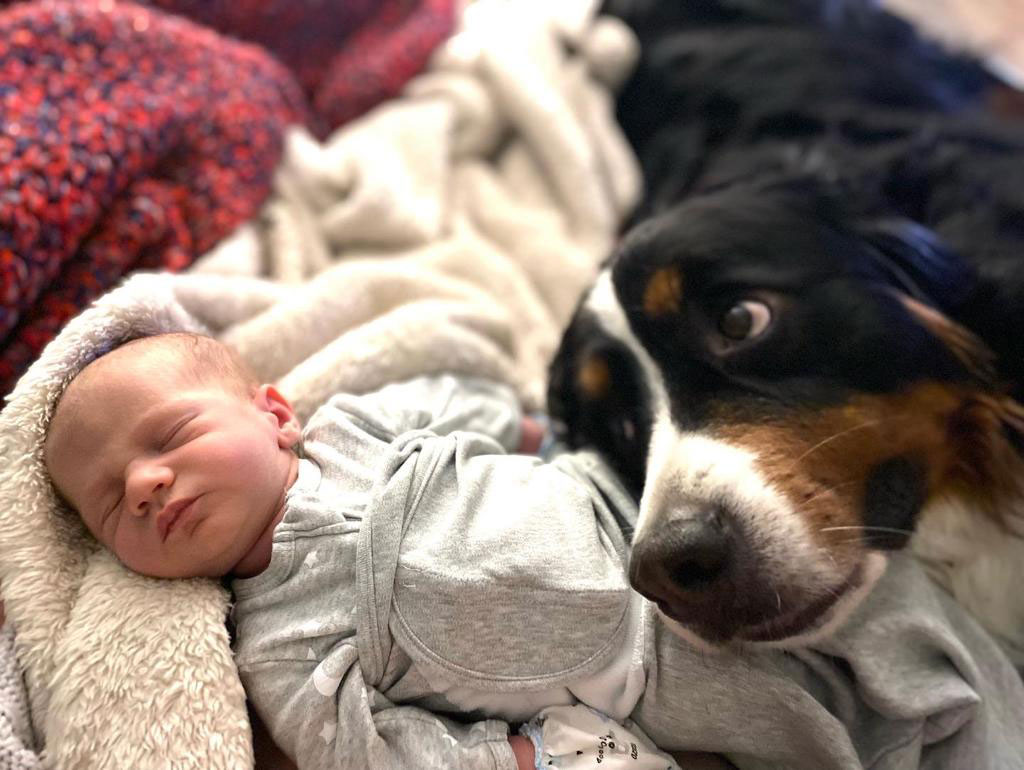No products in the cart.
Fun With Your Pets, Natural Pet Health
New Love: Introducing Pets to Babies
We recently had a wonderful new addition to the HomeoPet family as at the very start of January this year, Aindriu & Katie Farrington celebrated the birth of their beautiful new son Jamie!
If you follow us on Instagram you may have already met Maui. Maui is Aindriu & Katie’s fur-baby and has been a huge part of their lives for the last four years and is, literally, top dog in the household. A wonderfully kind and good-natured dog who is an out-and-out people person, Aindriu & Katie were still rightly conscious about the need to plan how best to introduce Maui to Jamie as although the new parents had been planning for Jamie’s arrival for quite some time, for Maui he would appear overnight!
Welcoming a new baby into the world is an exciting experience, which can be even more exciting if there are animals in the house. And it’s not always easy. A new baby could mean your dog receives less attention or shorter walks than they’re used to. Babies also mean new things in the house, loud and unusual sounds, unfamiliar smells and potentially a lot of visitors too, which can be overwhelming for many animals, with dogs and cats in particular potentially becoming upset by the change in routine and unsettled by the new sights, sounds, and smells.
But there are many things you can do to prepare and make the transition easier for all involved.
Pre-arrival preparation
Although in your pet’s eyes, their new human brother or sister will arrive in an instant, preparing your pet for what’s to come is an important part of helping to keep them and your new baby safe. A few changes to begin making early include:
- Lessen attention and playtime. Though we know this will be hard to do, it’s important that your pet is comfortable spending time alone and not always being the centre of attention.
- Crate training – Introducing your dog to a crate and developing this into a fun, safe place for them to spend time could prove invaluable, particularly for a larger, pushy dog as there will be times when you absolutely need them to stay away. It’s important, however, to get your dog used to the crate, to make it a fun, rewarding place to be (cue their favorite dog treat that could become a crate-only treat) and never put a dog in a crate for the first time when the baby comes home.
- Walking the dog while pushing a stroller will not only help your dog to become accustomed to the new presence of the stroller, but will also help you to get to grips with handling your dog and the stroller, before the newborn is added to the mix!
- Scent Adaptation. Before the baby arrives, it can be useful to introduce your pet to the scent of baby lotion or powder that you will be using. Once the baby is born, it’s also a good idea for a family member to take an article of clothing the baby has worn to your home to introduce to the pet. Then, your pet will begin to know the distinctive scent that will be arriving soon.
Preparing the nursery
Give your pet time to adjust to the new environmental changes by unpacking new furniture and baby gear as early as you can.
You may opt to make the nursery completely off limits for the first few months of the baby’s life. After a while, parents may choose whether or not to allow the pet inside. For some, pets will never be allowed inside the nursery, while others may consider allowing pets to enter if a parent is present. It’s important to have a plan and to begin to teach your pet the new rules early, with consistent and calm reinforcement.
The big meet
There are many factors to consider when planning for the big meet between the new human and fur-siblings, but the most important part of the arrival process is to stay calm. Knowing how you plan to arrive will help alleviate stress and nervousness, which can in turn make your pets calmer during the introduction.
It is a good idea to allow the pet to greet the mother before meeting the baby. If possible, introduce pets and their new human siblings on neutral territory, such as outside on the sidewalk, but most importantly, each party should be secured — the pet on a leash or in some kind of container, the baby in a parent’s arms.
Aindriu comments “Couples should be on the same page and know their roles when it comes to the dog meeting and interacting the baby. For example, Mom will focus on Jamie and Dad will make sure that Maui is being gentle and not getting too excited. In the case that he does get too excited, Dad can discipline Maui or distract him while Mom takes care of the baby. Considering that Maui has a solid 100lbs on Jamie, it wouldn’t be a fair fight!”

Adapting to a new way of life
No matter how much you love and trust your pets, even if they have been around older children, it is vital that you never leave children alone with them. Unsupervised infants and young children is not to be recommend.
Your pet has been used to having you all to itself, so jealousy can be a challenge you may face. It’s important to reassure your animals that life hasn’t changed all that much and to make sure you continue to give them special attention.

This was an issue that Aindriu & Katie faced with Maui. “In the early days, Maui definitely went through a bit of a jealous phase. He was fine with me and also fine with Katie when Jamie was sleeping, but he wouldn’t sleep in our bed anymore and tended to shy away from Katie when she was with Jamie, which was a first for sure. We think he was just being a bit more cautious around the baby, and our belief was this was just a phase. Given how young Jamie was we still hadn’t been straying out of the house much, and that started to wear on Maui a bit! Which you can’t blame him for. We just tried to keep everything as normal as possible for him, with continued love and attention, drives to run around on the beach so he can let out some energy and get all his daily sniffing in.”
They say that patience is a virtue and this is most certainly the case when it comes to animals and children. So, it needs to be multiplied when they’re both involved! Aindriu continues “When you’re constantly sleep deprived due to the constant changing sleep schedule of a newborn and juggling the necessities of life/work/home duties/keeping up with family & friends, it’s really easy to become frustrated and lose your patience, which really doesn’t help any cause. There have been situations where it almost seems as if Maui is acting spiteful, but realizing that he is still adjusting and going about dealing with him in a positive and constructive way is really important. We are used to him hanging with us on or near the couch, and there are times where he won’t get on when Jamie is around. So, we give him a snack and see if he joins us after or if he will just hang on the kitchen tile or by the front door”.
One thing to remember is that it will take time. “Maui is still adjusting, but we can already see huge improvements within the first 2 months. He’s back to hanging on the bed and couch with us again, and he even gives Jamie kisses here and there; for which we give high praise and positive reinforcement in the form of belly rubs, good boys, treats, and butt scratches (also known as butt scritches in our house, Maui loves a good butt scritch! He’ll even meet us halfway by getting his butt ready for a scritch from us)”.
As a new, slightly larger family, you will have many exciting times and adventures to look forward to. And once you get into a grove, you’ll be able to spend more time with your fur babies and everyone can enjoy the new norm together.






